Centrifugal juicer vs cold press juicer: which should you buy?
Which is better for you – a centrifugal juicer or a cold press juicer? We compare them like for like so that you can see which is better suited to your habits
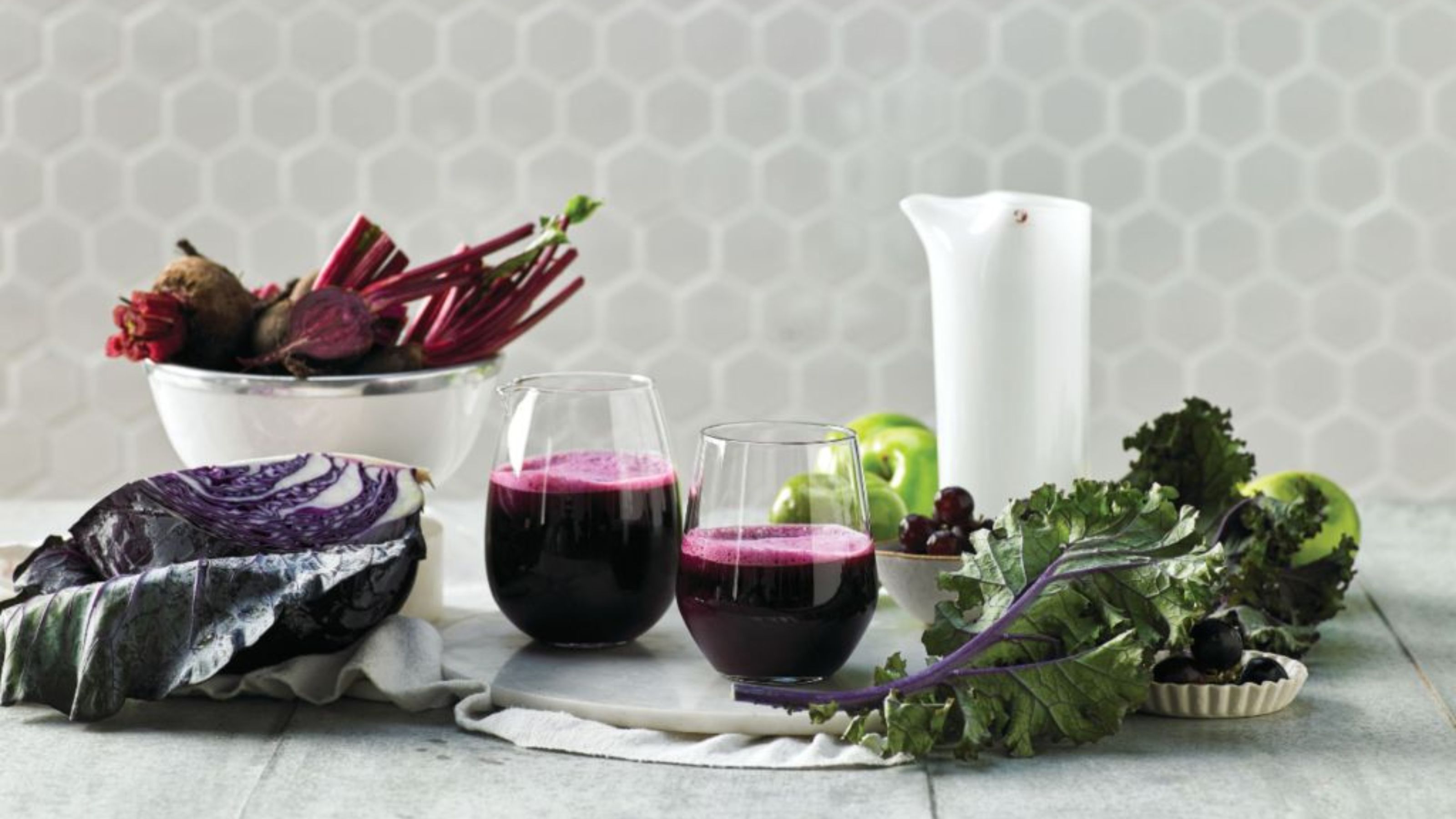

Adding a juicer to your kitchen arsenal is a great step to a healthier lifestyle.
If you are on the lookout for the best juicers, you may be wondering whether to shop for a centrifugal juicer or the best cold press juicer. It helps to understand what both kinds of juicers can do for you, your household and your health.
Below, I explain the differences, and what each is typically good at versus the other, too. At the bottom of the page are both appliances, listed with today's best prices.
Centrifugal juicer vs cold press juicer: which to buy
Packed with goodness, a glass of freshly made juice is the perfect way to start the day. Extracting your own not only allows you to create different flavor combinations, but also means your juice is as fresh as it can be, preserving more vitamins, minerals, and fiber than you’ll find in shop-bought blends. So if you want to get the whole family hooked on a healthy habit, we’ve decoded the differences between centrifugal juicers and cold press juicers, which are also known as masticating juicers.
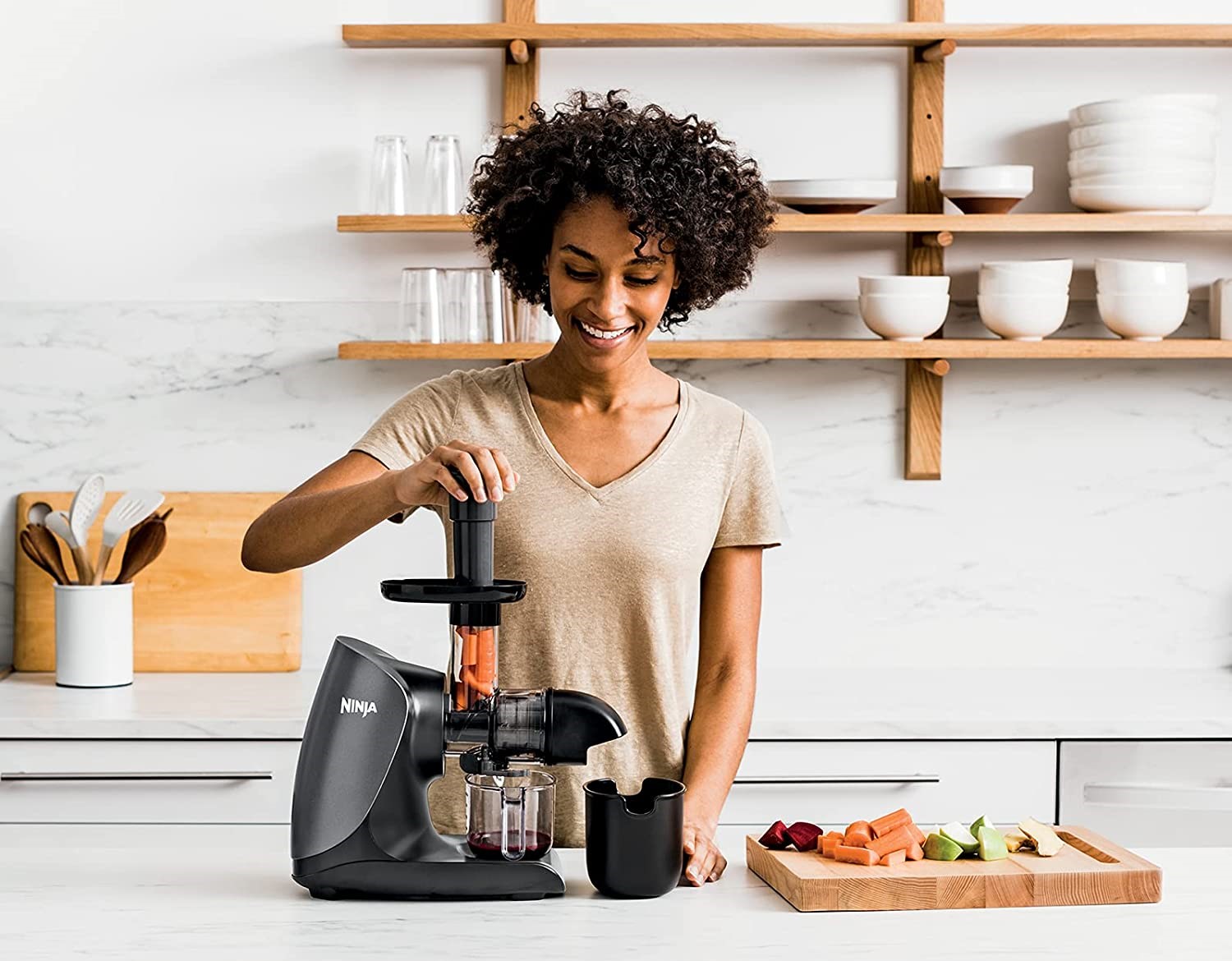
What are cold press juicers?
If you are looking for optimum goodness, it pays to pick a masticating juicer. They may be slower than centrifugal models, but they work extremely hard, crushing and squeezing fruit and vegetables to release as much juice as possible. The juice tends to be thicker, with more fiber retained, but you may find there’s more prep work involved, such as chopping whole fruit into pieces to fit in the spout.
Masticating juicers, also known as cold press or slow juicers, can tackle green leafy vegetables and soft fruits, such as grapes, as well as harder produce. Although they’re usually pricier than centrifugal juicers, it’s worth the investment if you plan to use yours frequently, and the lack of a blade makes for a quieter, easier-to-clean machine. Available as horizontal or slim vertical models, choose the latter for a smaller footprint on your worktop.
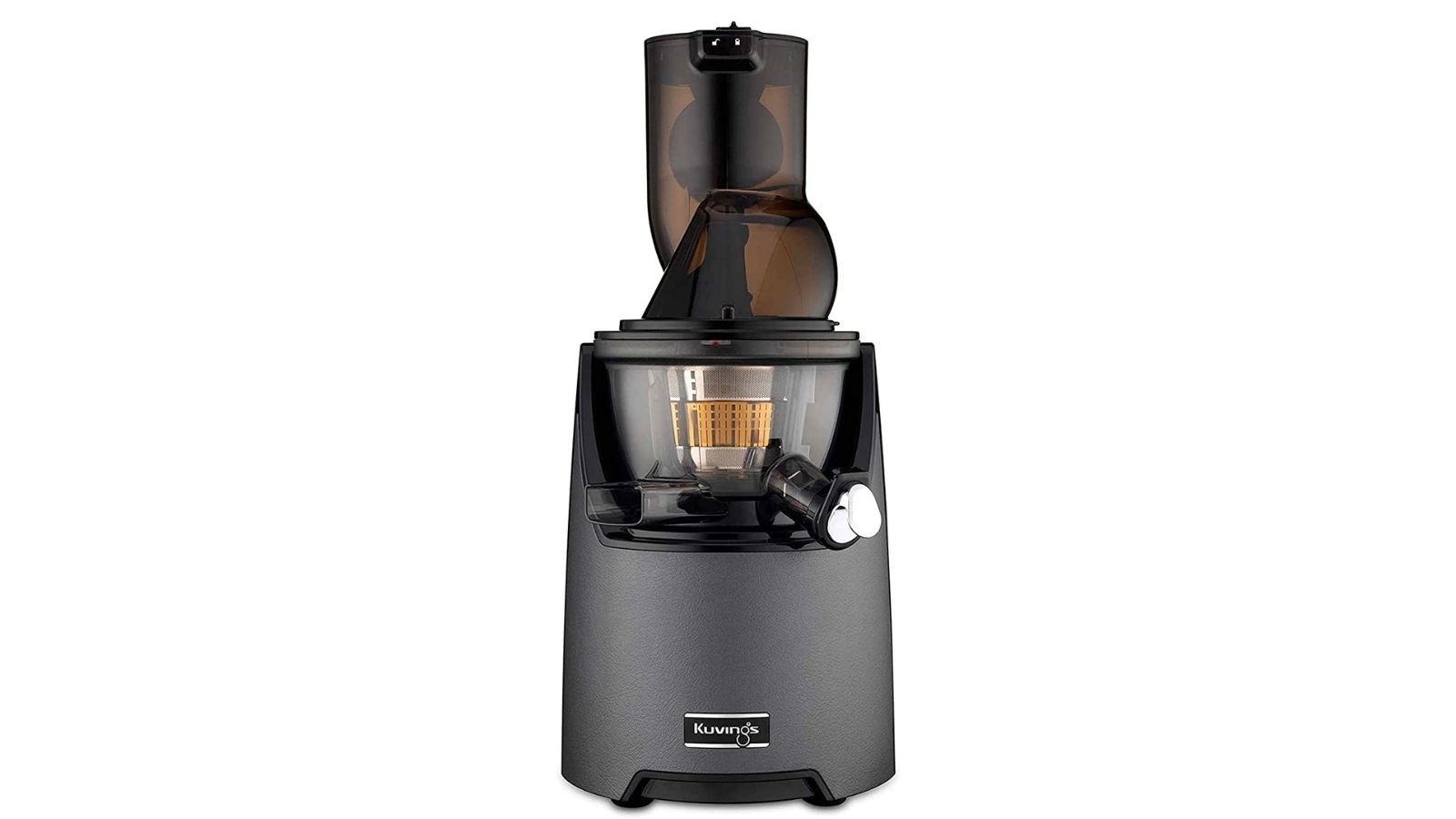

Specifications
Reasons to buy
Reasons to avoid
Our product tester Camryn loved this premium juicer. This efficient machine squeezed as much juice as possible out of apples, pineapples, grapefruits and ginger, and the wide two-way feed chute made preparation easy and quick.
Unbelievably, you can even make almond milk with this juicer, though Camyrn's tests found that it has a short shelf life. For added versatility, you can also use the included sorbet and smoothie strainers. they make it easy to make smoothies and sorbets at home, which is perfect for healthy drinks and desserts.
A big problem with masticating juicers is their speed - they're referred to as 'slow juicers' for a reason. However, Camryn was 'impressed' with the speed of this juicer, finding it faster than other masticating juicers she's tested.
The Kuvings Whole Slow Juicer EVO820 is an expensive option, but that's a justified price tage for the smartest and most convenient slow juicer on the market. It's also covered by a fantastic 10-year warranty, so you can make delicious, healthy juices for years.
Camryn's full Kuvings Whole Slow Juicer EVO820 review has more details.
What are centrifugal juicers?
For juice without the wait, choose a centrifugal model. These work by shredding fruit on rotating blades, before spinning it at high speed to separate the juice from the pulp through a mesh. Ideal for hard fruit and vegetables, such as apples and carrots, they’ll get through a large amount in a short space of time, with little or no need for chopping or peeling first (apart from the thick skin of a pineapple).
In the main, centrifugal models cost less than masticating machines, but incorporate more air into the juice, making it foamy and reducing its shelf life, so they’re best for juicing to order. They also produce a thinner juice with less pulp, will struggle to deal with green leafy vegetables and wheatgrass and can be noisier due to their powerful motors.
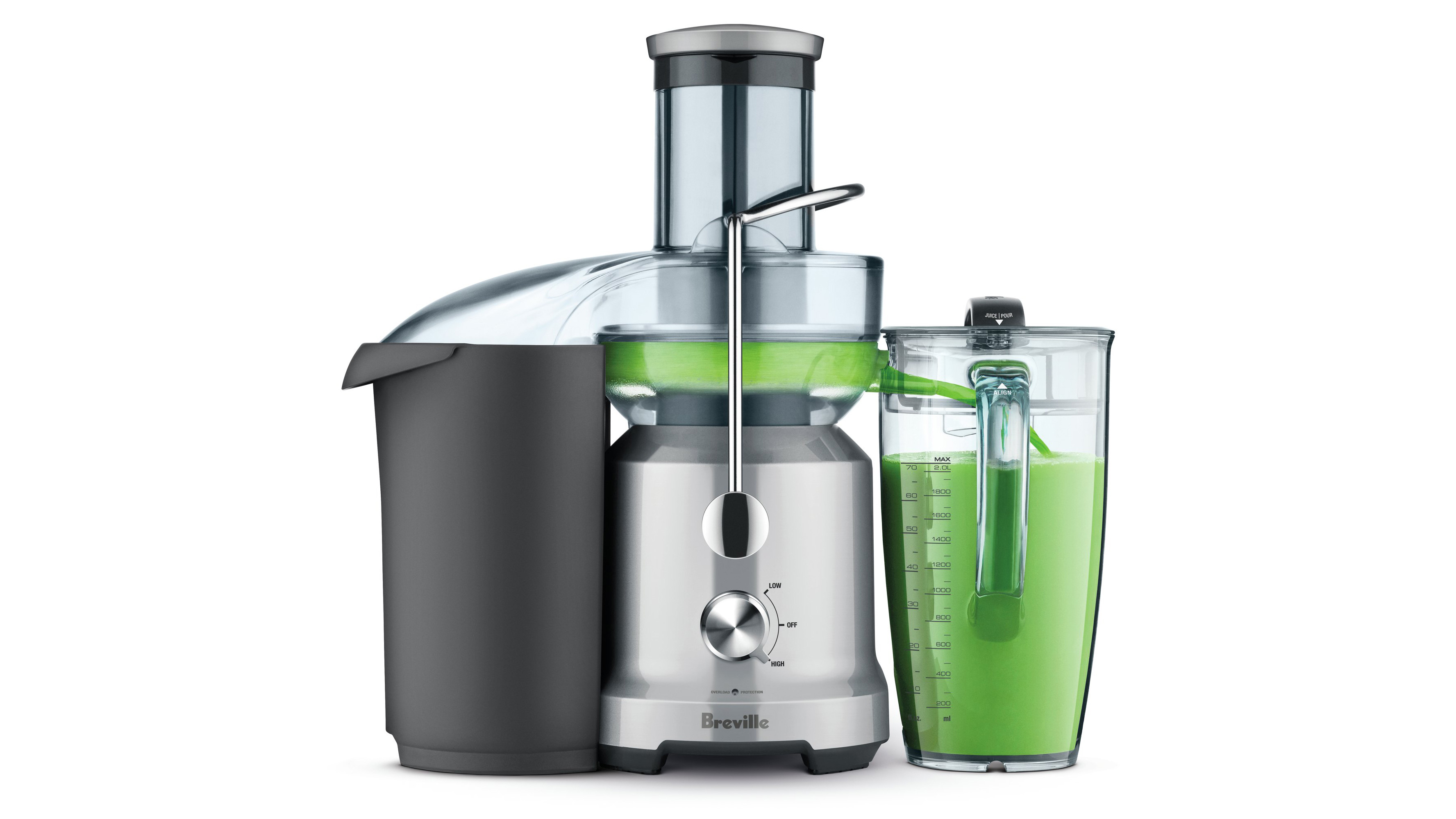
Breville Juice Fountain Cold BJE430SIL
Specifications
Reasons to buy
Reasons to avoid
If you decide to go for a centrifugal juicer, this has to be one of the best all-rounders you can buy. It strikes the right balance between features, performance and value for money.
The Juice Fountain has Breville's Cold Spin technology, designed to keep the juice cold by keeping it away from the base of the juicing chamber. If you're at all worried about centrifugal blenders heating up your drink and destroying nutrients, you can rest easy knowing that this technology results in less than 1.8°F of heat transfer when extracting juice.
The 3.3-inch feeding chute ensures this juicer is fuss-free. Unlike other juicers, you don't need to chop your ingredients, just throw them in. The powerful 850w motor is more than a match for whole apples and carrots.
It juices into an enormous 70 fluid oz jug too, and with a large external pulp basket, you should be able to make plenty of juice for your whole family in a single sitting. The tight-close lid extends the shelf life too, minimizing oxidation so you can keep your juice for three days rather than just one.
Most of the removable parts are dishwasher safe, though you'll need to wash the juice jug, cover and sealing lid by hand. Thankfully, the rest can be handled by your dishwasher, leaving you more time to enjoy your juice.
Centrifugal juicer vs cold press juicer: which is healthier?
A juicer, whether cold press or centrifugal, is the best way to extract juice and nutrients from a variety of fruits and vegetables. There are two main types of general-purpose juicers: masticating (cold press) and centrifugal. Both work in different ways and have their own health benefits.
Centrifugal juicer: Centrifugal juicers use a fast-spinning blade to chop up fruit and vegetables, using fine mesh filters to separate the juice from the pulp. The main benefit of this type of machine is that you can throw in whole fruits, giving you quick results with minimal fuss. They also tend to be cheaper than cold press juicers.
The downside is that these juicers aren’t as efficient, so some juice gets passed out with the pulp. With the air and heat that’s introduced, juice can be frothy, can oxidize quicker, and won't last as long when stored.
Cold press juicer: Masticating juicers use a crushing, squeezing element to extract the juice. Although also known as slow juicers, these products aren’t that much slower than their centrifugal counterparts. Though, masticating juicers are much more efficient, so you’ll get more juice from each fruit, and with less air and heat added, the juice tastes fresher, lasts longer when stored and the color is brighter too.
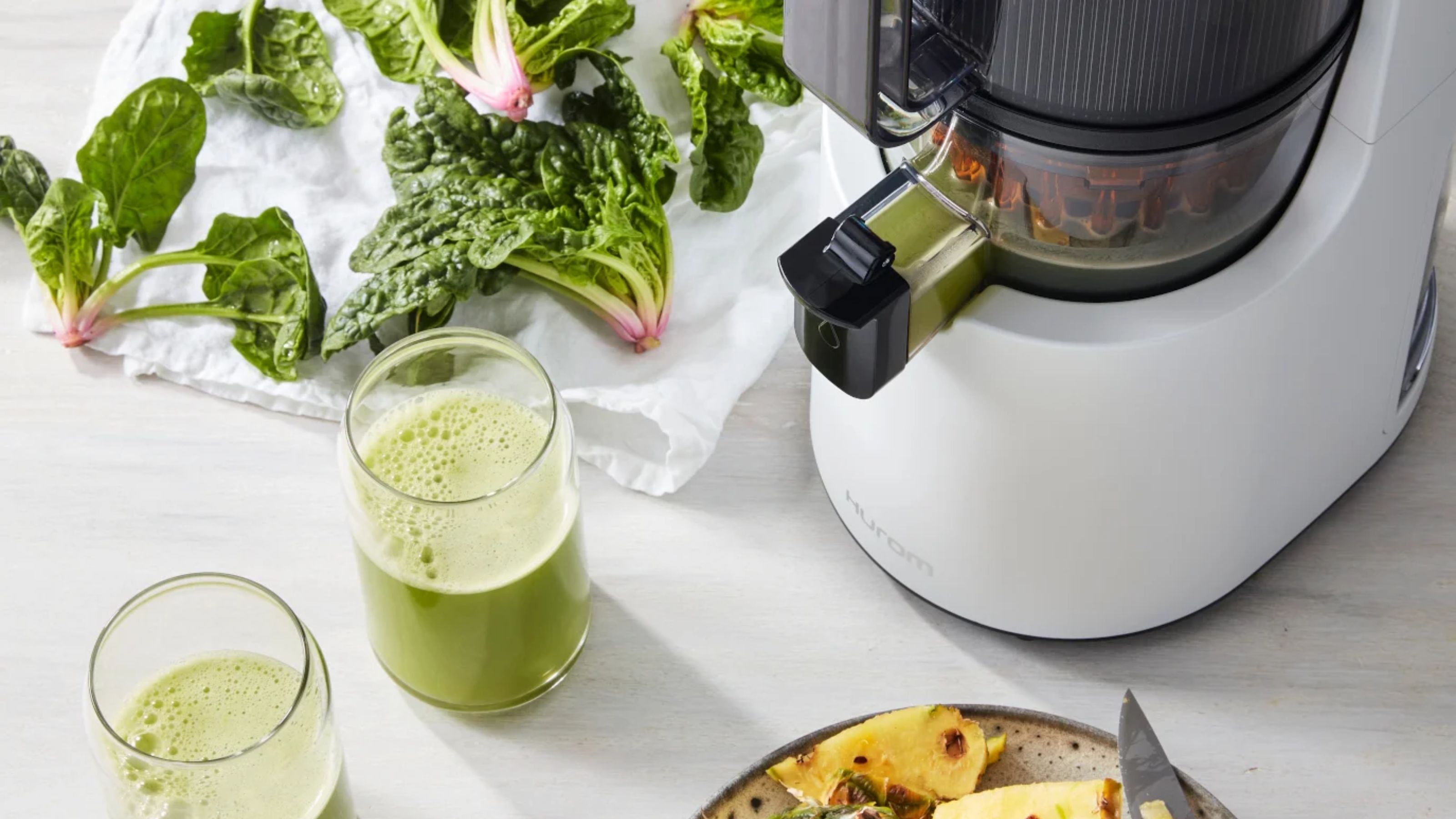
Centrifugal juicer vs cold press juicer: my verdict
My verdict? While it's not suitable for every space, I'd pick a cold press juicer for my kitchen. However, if you're someone who isn't fixated on the alleged health benefits of cold press juice, are on a tight budget, or simply someone who doesn't have a lot of time to wait for a cold press juice, then a centrifugal juicer works wonderfully to give you juice on the go. The biggest difference between the two is the level of oxidation, so do keep that in mind when making your final decision.
If you prefer smoothies to juices, you might want to consider investing in the best blender instead. It is vital that you understand the difference. When comparing juicers vs blenders, blenders mash everything together, while juicers are designed to separate the pulp from the juice, giving a smoother, more drink-like result.
'Not sure how much you'll actually use a juicer or a blender? Visit a juice bar and try some blends first,' says Millie Fender, reviews editor at Homes & Gardens. 'If you find lots of combinations that you like, you'll probably enjoy making your own.'
Sign up to the Homes & Gardens newsletter
Design expertise in your inbox – from inspiring decorating ideas and beautiful celebrity homes to practical gardening advice and shopping round-ups.

Jennifer is the Digital Editor at Homes & Gardens. Having worked in the interiors industry for several years in both the US and UK, spanning many publications, she now hones her digital prowess on the 'best interiors website' in the world. Multi-skilled, Jennifer has worked in PR and marketing and occasionally dabbles in the social media, commercial, and the e-commerce space. Over the years, she has written about every area of the home, from compiling houses designed by some of the best interior designers in the world to sourcing celebrity homes, reviewing appliances, and even writing a few news stories or two.
-
 Gwyneth Paltrow's quiet luxury kitchen is so beautiful, we almost overlooked her ultra-smart cabinets – they make the use of 'every inch' of storage space
Gwyneth Paltrow's quiet luxury kitchen is so beautiful, we almost overlooked her ultra-smart cabinets – they make the use of 'every inch' of storage spaceThe Goop founder makes use of dead space in her kitchen with customized cabinetry that reaches to the ceiling, providing ample storage
By Hannah Ziegler
-
 Martha Stewart's intelligent cabinets 'take every inch into consideration' – their 'visually light' style will solve your small kitchen storage problems
Martha Stewart's intelligent cabinets 'take every inch into consideration' – their 'visually light' style will solve your small kitchen storage problems'Every kitchen can be beautiful and functional, no matter what the size': 9 years since sharing her clever storage, Martha's cabinets are just as beautiful
By Megan Slack